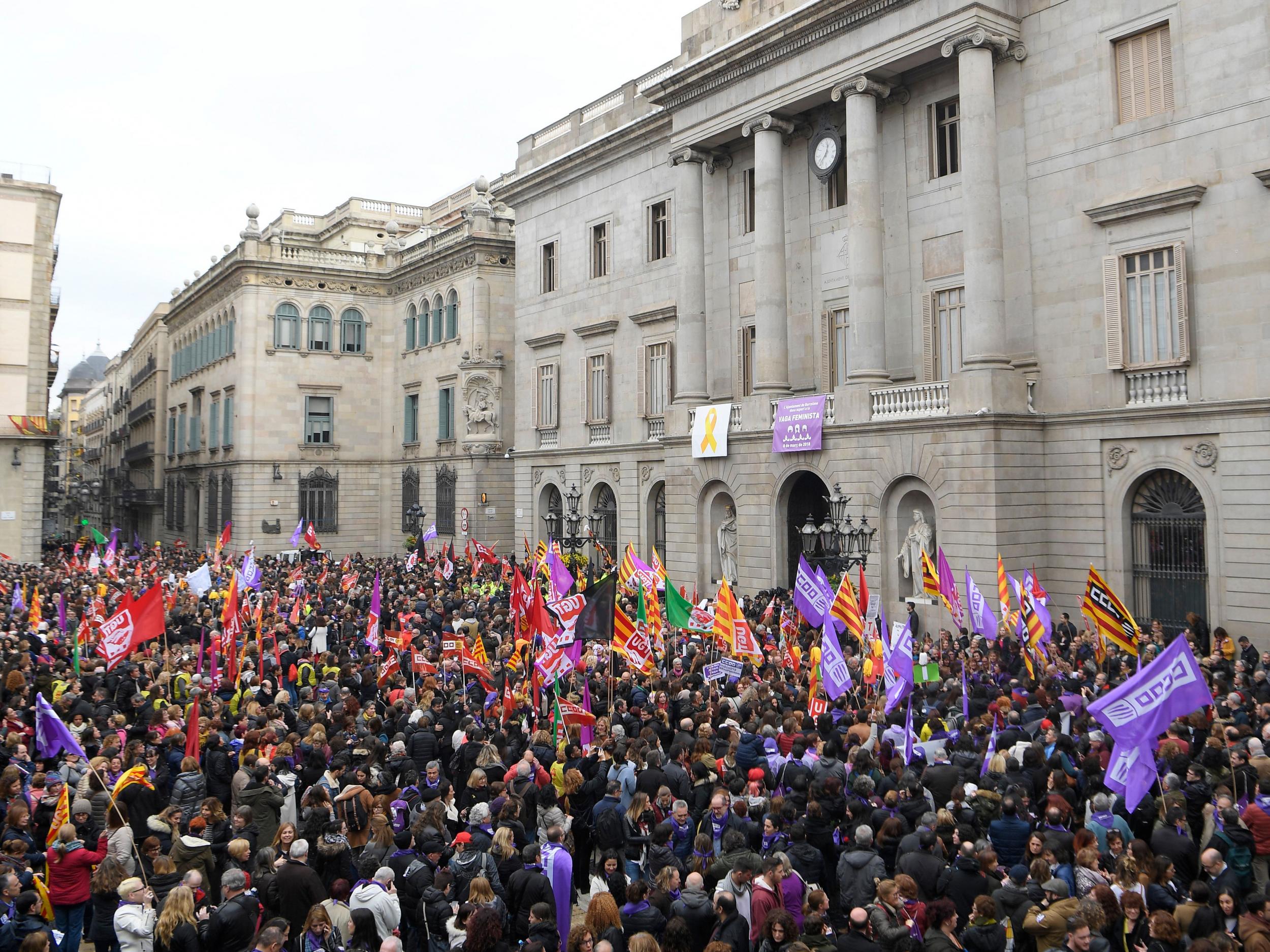International Women's Day: Hundreds of trains cancelled as Spanish women walk out in first 'feminist strike'
'I think the main impact the strikes will have is raising awareness of the issues and inequalities women still face. And in turn encouraging people to do something about it!'
Your support helps us to tell the story
From reproductive rights to climate change to Big Tech, The Independent is on the ground when the story is developing. Whether it's investigating the financials of Elon Musk's pro-Trump PAC or producing our latest documentary, 'The A Word', which shines a light on the American women fighting for reproductive rights, we know how important it is to parse out the facts from the messaging.
At such a critical moment in US history, we need reporters on the ground. Your donation allows us to keep sending journalists to speak to both sides of the story.
The Independent is trusted by Americans across the entire political spectrum. And unlike many other quality news outlets, we choose not to lock Americans out of our reporting and analysis with paywalls. We believe quality journalism should be available to everyone, paid for by those who can afford it.
Your support makes all the difference.Women in Spain have marked International Women’s Day by deserting paid and unpaid labour to take part in the country’s first nationwide “feminist strike”.
The 24-hour walkout, aimed at drawing attention to domestic violence, sexual discrimination and the gender pay gap, has substantially disrupted the country's train network.
Its transport ministry announced 300 trains would not run on Thursday.
The strike, which has been called by ten unions, kicked off with a pot-banging demonstration in Madrid public square Puerto del Sol at midnight. Activists marched to call for an end to gender disparities in salaries, gender violence and the nation’s “macho” culture.
Feminist groups called for women to abandon their domestic chores for the day and not spend any money in an attempt to show how integral women are to the economy.
The walkout has gained the backing of some Spain’s highest-profile female politicians – including the mayors of Madrid and Barcelona.

But the protests have also been the subject of heated debate in the country in recent weeks. The ruling centre-right party, the Partido Popular (PP), claimed the action was "for feminist elites and not real women with everyday problems".
Iconic Spanish actor Penelope Cruz showed solidarity with the protests by cancelling public events she had planned and also going on “domestic” strike - leaving her partner Javier Bardem to care for their two children.
Holly Hosie, a 22-year-old Briton who teaches in Spain, said she was joining in.
“Today, along with the majority of the other female teachers at my school, I’m taking part in the ‘huelga feminista’ (feminist strike), in support of gender inequality, discrimination, oppression, domestic abuse, sexual assault and the gender pay gap,” she told The Independent.
Ms Hosie, who said she would attend a march at 7pm in Madrid, said she thought the chief purpose of the strikes was to highlight gender inequalities.
“I think the main impact the strikes will have is raising awareness of the issues and inequalities women still face. And in turn encouraging people to do something about it!”
She noted that a good deal of Spaniards were supportive of the strike but were not striking themselves as they cannot afford to do so.
Asked about the difference between Spain and the UK in terms of gender relations, she said: “I’m not sure if Spain is less equal than the UK but it does feel slightly more behind the times in general, so I suppose that includes gender equality as well.”
Ms Hosie said she noticed some small businesses in Madrid were closed in support.
Spanish paper El Pais shared a video explaining that they are not fully staffed today because of the action.
A poll for the newspaper found 82 per cent supported the strike while 76 per cent thought women living in Spain had more difficult lives than their male counterparts.
In Spain, women were paid 13 per cent and 19 per cent less than their male counterparts in the public and private sectors, data from the European Union's statistical provider Eurostat said.
In 2016, women's gross hourly earnings in the European Union were on average 16.2 per cent below those of men.
Government statistics also demonstrate that reports of violent abuse in Spain is rising - there were 129,193 reports in 2015 and 142,893 in 2016. Last year in Spain 49 women were killed by their partners or ex-partners in comparison to 44 in 2016.
Activists are urging women in the UK to go on strike, with organisers from Women's Strike UK saying 2,000 people are expected to meet in central London.
Organiser Noshin Salari Rad said: “Thursday is about solidarity between all women– trans women, women of colour, indigenous, working class, disabled, migrant, sex workers, Muslim, lesbian and queer.”
Further afield, people in the Philippines, Nepal, South Korea and Hong Kong marked International Women’s Day with protests.

Join our commenting forum
Join thought-provoking conversations, follow other Independent readers and see their replies
Comments